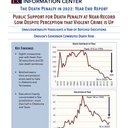
The long-term decline of death-penalty use in the U.S. continued in 2018, as a twentieth state abolished capital punishment and executions and new death sentences remained near generational lows. On October 11, the Washington State Supreme Court struck down the state’s death penalty, finding that it was imposed arbitrarily and in a racially discriminatory manner. Washington became the eighth state to legislatively or judicially abolish the death penalty since 2007. According to the Death Penalty Information Center’s 2018 Year End Report, fourteen states and the federal government have imposed a total of 41 new death sentences this year, with one more death sentence anticipated towards the end of the year. Eight states carried out a total of 25 executions.
The executions and death sentences extended a long decline in capital punishment, with fewer than 30 people executed and fewer than 50 sentenced to death in each of the last four years. Before this four-year period, neither had happened in a quarter century. For the first time since death sentencing resumed in the U.S. in 1973, no U.S. county imposed more than two death sentences. The death penalty remained geographically isolated, with most executions carried out in a few southern states. More than half (13) were in Texas, and the nine executions carried out in the rest of the country were the fewest executions in those 49 states since 1991.
The declining usage of capital punishment, however, did not redress concerns about the manner of its application. “Death sentences have been dropping over the course of the last 25 years and the hope always had been that as use of the death penalty declined, it would be imposed in a way that would be less arbitrary and less discriminatory,” Death Penalty Information Center Executive Director Robert Dunham told the Houston Chronicle. “That hasn’t happened, and in many respects it’s gotten worse.” A review of the 2018 executions by DPIC and the Promise of Justice Initiative found that 72% of the prisoners executed showed evidence of serious mental illness, brain damage, intellectual impairment, or chronic abuse and trauma, and four were executed despite substantial innocence claims.
Public opinion polls in 2018 also showed that support for the death penalty remained near historic lows, with 56% of Americans saying they support capital punishment (down from 80% in the 1990s). For the first time since Gallup began asking about the fairness of capital punishment in 2001, fewer than half of Americans (49%) said they believe it is fairly applied. Election results confirmed the reduced public appetite for the death penalty. The three states with death penalty moratoria (Colorado, Oregon, and Pennsylvania) elected governors who will continue those policies. Prosecutors in six counties known for the heavy use of the death penalty were defeated, replaced in most case with candidates who ran on reform platforms pledging to use the death penalty sparingly, if at all. Since 2015, voters in 11 of the 30 most prolific death-sentencing counties have replaced their prosecutors.
“America continued its long-term movement away from the death penalty in 2018,” Dunham said. “Even in the face of inflammatory political rhetoric urging its expanded use, voters showed that the death penalty is no longer a political wedge issue. The reelection of governors who imposed death penalty moratoria, the replacement of hardline pro-death-penalty prosecutors with reformers, and Washington’s court decision striking down its death penalty suggest that we will see even greater erosion of the death penalty in the years ahead.”
(The Death Penalty in 2018: Year End Report, DPIC, December 14, 2018; Richard Wolf, Death penalty sentences, executions remained at near-record lows in 2018, USA Today, December 18, 2018; Keri Blakinger, Texas sent 7 people to death row in 2018. All of them were people of color., Houston Chronicle, December 14, 2018; Holly Meyer, Death penalty in US is near historic low even as Tennessee executes 3 this year, Nashville Tennessean, December 14, 2018.) See Reports.



